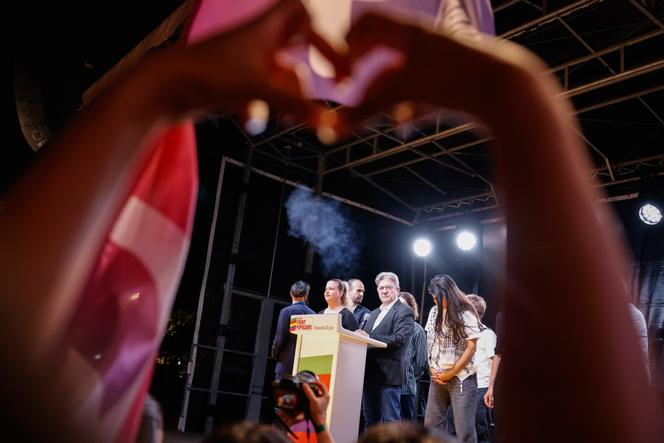


On the evening of Sunday, June 30, the Place de la République in Paris was full. Brandishing flags in the colors of the radical left La France Insoumise (LFI) party, the Greens and the Socialists, unfurling banners with anti-fascist slogans on the huge bronze statue in the shape of the allegory of the Republic, hundreds of young people came once again to rally against the far right.
This time, they were there at the invitation of the Nouveau Front Populaire (NFP), the left-wing alliance they voted for in the first round of these snap elections. But it was not a night for cries of joy – more like anger at the triumphant outcome that is taking shape for the far-right Rassemblement National (RN). The crowd chanted classic anti-RN slogans.
All those present knew that the NFP's score of 28%, according to the latest Interior Ministry results, was insufficient to prevent victory for Marine Le Pen's party. "It's encouraging, but not enough," lamented Lucie Frappat, a 26-year-old physiotherapist. Joëlle Caron said she felt "sadness." "I feel like we're reopening a page in history," she said. The name of LFI leader Jean-Luc Mélenchon came up in conversation. "It would be nice if he stepped aside for a cleaner, newer figure. We'd have more peace of mind for what's to come," said Romain (who didn't want to give his full name), an actor and drama teacher, despite being a fan of the three-time presidential candidate.
It was 11 pm when, finally, the NFP's leaders arrived together. "It has to be said, Matignon [the prime minister's residence], Macron, it's over," proclaimed the head of the Greens, Marine Tondelier. The leader of the Socialist, Olivier Faure, re-elected in the first round in his constituency of Seine-et-Marne, launched an ode to a diverse France that accepts "all origins, all skin colors." As he took the stage, Mélenchon proclaimed to applause: "In this country, there's no escape. It's them or us, there's nothing in between."
But behind the enthusiasm, the left hid its disappointment at a score that was not as high as it could have been. The very high turnout in the legislative elections (some 20 points higher than in 2022, with over 66.7% of voters), unheard of since 1997, doesn't seem to have benefited the NFP. The alliance exceeded by a few points the score obtained two years ago by its predecessor, the NUPES alliance, when, according to the count carried out by Le Monde using Interior Ministry data, it had gathered 26.2% of the vote in the first round, ahead of the presidential coalition (25.8%).
You have 67.43% of this article left to read. The rest is for subscribers only.
